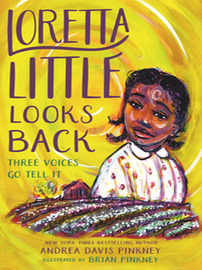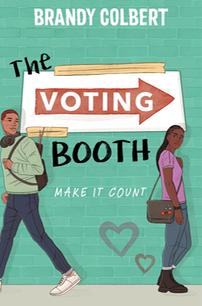
|

|
Andrea Davis Pinkney is the author of numerous books for children and young adults. Her work has received multiple Coretta Scott King Book Award citations, and she is a four-time nominee for the NAACP Image Award.
Brandy Colbert is the award-winning author of several books for children and teens, and her short fiction and essays have been published in a variety of acclaimed anthologies for young people.
Here, Davis Pinkney and Colbert discuss their recently published novels, Loretta Little Looks Back (Little, Brown Books for Young Readers) and The Voting Booth (Disney-Hyperion), and what compassionate social action means for kids today.
Davis Pinkney: Brandy, here we are about to step up to the front door of another Election Day, and we've each written books about the power of voting and how young people play an important role in election outcomes. Your main characters, Marva and Duke, couldn't be more different in their attitudes about voting. Marva is all about it, whereas Duke, well, voting isn't at the top of his "to do" list.
Colbert: He is still working out his grief over his older brother's death, and voting reminds him of his brother's activism, so he's found it easier to distance himself from causes. But anyone can find an excuse to check out when it comes to politics, and I really wanted to stress the importance of showing up, even if you don't think it will make a difference. I think kids today are even more aware of the impact of their vote than when I was a teenager in the '90s--they're marching, canvassing, text banking and talking to people in their lives.
Andrea, in your book, the kids' voices come through in such powerful ways. I was instantly struck by the format of Loretta Little Looks Back. The title page calls it a monologue novel, which I've never heard of or read before. What was your inspiration and what were some of the challenges and joys of working with this structure?
.jpeg)
|
|
| Andrea Davis Pinkney (photo: Christine_Simmons) |
|
Davis Pinkney: Loretta Little Looks Back has allowed me to pursue my theatrical passions. I came up with the "monologue novel" format so kids could get behind the eyes of the characters in the Little family. The narratives can be read aloud and shared with friends in a readers' theater. That's my hope--that kids will become active participants in the story so that they can feel what's happening. The Littles' stories are rooted in the oral tradition and presented through a mix of first-person narratives, spoken-word poems, folk myths and gospel rhythms that illuminate the dignity of sharecroppers in the rural South. Sometimes I feel like the novel wrote itself. These characters started talking to me in their raw, unvarnished vernacular. While I was writing, I was very mindful of how the kids in the story express their frustration, confusion and anger about racism.
Your characters are so well drawn and real. Was that a deliberate choice on your part?
.jpg) |
|
| Brandy Colbert (photo: Jessie Weinberg) |
|
Colbert: I loved the outspoken brassiness of your characters, especially since so many people in their generations were encouraged to keep quiet and just go along with the status quo. Characterization is my favorite part of writing fiction. Even if readers don't agree with my characters or relate to them, I want them to feel like they could run into them on the street.
Andrea, your characters speak to us from the Jim Crow South. What type of research did you do to really get into their voices and the setting?
Davis Pinkney: The Littles spring from the voices of my very own family members who worked land and were grass-roots organizers. To support the narratives with facts of the era, I listened to oral histories of Mississippi sharecroppers, conducted interviews, consulted with historians and pored over books and archival images. But the blood and bone of the characters stem from the front porches of my childhood, when my great-aunts and uncles would "speak on it" deep into the evening.
Though our books each have their own distinct approaches to tone and structure, I think they're similar in intention. I'm struck by the fact that the young people in each of our stories want the same things: to be heard, to be understood and to find ways to deal with injustices and setbacks. At the same time, our books both manage to ring notes of optimism. Is that what you were going for?
Colbert: I did want to leave readers with a sense of hope. I never reveal who's running for election or even who wins, because that's not the point; I wanted readers to think more about taking action and fighting for what they believe in, even if the outcome might not work in their favor. A lot of us are terrified that things may not go our way in this upcoming election, but we're still fighting, still doing whatever we can to usher in change.
Davis Pinkney: I wish we'd been in touch during the writing process. We could've shared a box of tissues. I don't know about you, but in writing this particular novel, I was, without knowing it, inviting myself to my own catharsis. I want to do the same thing for kids. I want to reach out a hand that says, It's okay, we can do this together. I felt that while reading your book.
Colbert: I absolutely agree. As soon as I began reading Loretta Little Looks Back, I felt like I was home. I think both of our books really speak to how important it is to hold onto each other and work together.
Davis Pinkney: Civil rights is the key plot-driver in each of our novels. It's so hard not to get on a soapbox! I think we've each done a pretty good job not preaching. But between the lynching of Emmett Till that happens in Loretta Little Looks Back, and the threats to Duke's dignity that happen in The Voting Booth, lined up against the Black Lives Matter movement that's happening right now on the sidewalks and streets, there are times when I'm pretty damn angry. My hope is that our books will spark some important conversations and invite kids to do some probing.
Colbert: Both The Voting Booth and Loretta Little Looks Back are timely but they're also timeless. In terms of the struggles Black Americans have been facing for centuries when it comes to inequalities, including voting rights, how do you think historical fiction in particular can help young readers process present-day events?
Davis Pinkney: It's interesting, kids could read our books side-by-side. The race conversations that were happening in 1968 are going on right this minute. And both our novels delve into so much more than voting rights. To me, they're about legacy. When Democratic vice presidential candidate Kamala Harris delivered her speech at the Democratic National Convention last summer, she began with a roll-call of Black women who'd come before her--Mary McLeod Bethune, Shirley Chisolm, Fannie Lou Hamer and others. Those women from the past laid out the roadmap to where we're going. That's what books do. They lead the way.

